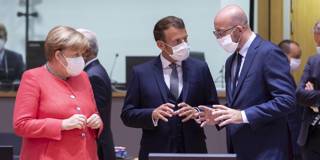Although new leadership in the United States will not miraculously end the COVID-19 pandemic and recession, it at least enables the global response that is urgently needed. The question now is whether the US and Europe can double down on stimulus and come to the aid of the developing world.
NEW YORK – As we head into a new year, this much is patently clear: COVID-19 is not just going to disappear, as outgoing US President Donald Trump repeatedly suggested it would. Although there has been a substantial economic recovery from the depths of the initial lockdowns last spring, the losses to GDP and employment around the world are enough to make this the second- or third-worst downturn of the last hundred years. And this is true even as vaccines are approved for use.
Returning to normal will take time, raising the question of how much damage will be incurred in the interim. The answer will depend on the economic policies that major countries pursue in the coming months. There is already significant potential for hysteresis (long-lasting) effects. Household and firm balance sheets that have been eviscerated will be restored only gradually; firms that have gone bankrupt during the pandemic will not suddenly become “un-bankrupt” when the virus is brought under control.
In managing these effects, an ounce of prevention would be worth a pound of cure. Yet at this point, the near-term outlook remains tremendously difficult to read.

NEW YORK – As we head into a new year, this much is patently clear: COVID-19 is not just going to disappear, as outgoing US President Donald Trump repeatedly suggested it would. Although there has been a substantial economic recovery from the depths of the initial lockdowns last spring, the losses to GDP and employment around the world are enough to make this the second- or third-worst downturn of the last hundred years. And this is true even as vaccines are approved for use.
Returning to normal will take time, raising the question of how much damage will be incurred in the interim. The answer will depend on the economic policies that major countries pursue in the coming months. There is already significant potential for hysteresis (long-lasting) effects. Household and firm balance sheets that have been eviscerated will be restored only gradually; firms that have gone bankrupt during the pandemic will not suddenly become “un-bankrupt” when the virus is brought under control.
In managing these effects, an ounce of prevention would be worth a pound of cure. Yet at this point, the near-term outlook remains tremendously difficult to read.